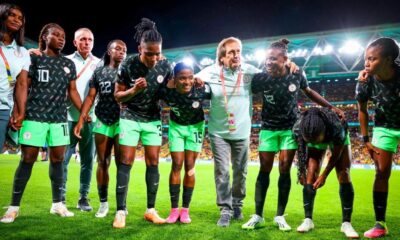
This guest feature is written by Gabby M.H. Yearwood, Teaching Professor in the Department of Anthropology and Managing Faculty Director for the Center for Civil Rights and Racial Justice in the Law School at the University of Pittsburgh
When I took 11 students from the University of Pittsburgh to Australia this summer for the Women’s World Cup, I expected them to learn an abundance of lessons about the interrelatedness of race, gender, nationalism and sport.
Shortly after the championship match between Spain and England concluded on Aug. 20, however, it wasn’t just my students learning hard lessons about the inequities faced by women in sports – it was the entire world learning a lesson after an act of brazen impropriety played out at the sport’s highest level.
There were powerful, positive lessons, too.
We saw first-hand the immense support for women’s sports in many corners of the world, with 80,000 people at the opening match and national viewership and attendance records in Australia being broken almost every game. Merchandise sales outperformed expectations. And sponsor’s financial commitment to women’s sports was apparent from signs, logos, tents and appearances.
The amazing quality of play by every team demonstrated the rise of women’s soccer globally and led to memorable, freeze-frame moments like the free kick by Panama’s Marta Cox against France and the masterful goal by Colombia’s Linda Caicedo — an 18-year-old cancer survivor — against Germany. There was the 20-shot, penalty-kick marathon between Australia and France, and the 1-0, championship-winning goal from Olga Cormona, who had just learned of her father’s passing.
There were moments as teachable as they were historical: Quinn from Canada playing as the first non-binary player in a World Cup; Morocco’s Nouhaila Benzina becoming the first woman to play in a hijab in the World Cup; Australian captain Samantha Kerr participating as an openly queer Aboriginal woman. We once again saw how these athletes could more than withstand the pressure of the world watching.
Other lessons weren’t so inspiring.
Nigeria and Jamaica’s soccer federations did not give adequate funding to their national teams. Jamaica, specifically, had to use crowdfunding to get to Australia. Canada and France almost did not attend because of fair-pay and fair-treatment disputes with their respective national federations. Spain had players boycott, arguably some of the nation’s best, because of issues of physical, emotional and sexual harassment. The Spanish team members who did go played under protest after signing a pre-tournament letter.
Even though many of the several hundred players identified as either openly queer or allies of LGTBQ teammates, FIFA forbade any openly recognizable displays of people’s sexual and gender identities. Players found ways to circumvent this edict with hairstyle coloring, fingernail painting and carefully placed flags in social media feeds.
Despite their greatness on the field, many of these athletes would not receive the equitable pay, compensation, and access to resources they are due. Their own governments failed to protect and support them; they were not taken seriously as professionals, people with integrity.
Unfortunately, the most important lesson learned came during a time of celebration and jubilation. Spain had just defeated England to earn its first ever World Cup title – the team had just reached the pinnacle of years of hard work and effort. At the thrilling conclusion, what would they receive? A kiss. Unwanted. A kiss for all their hard work, sacrifice, injuries, commitment, and excellence. The now-famous kiss is symbolic of what women receive globally for their contributions to society. Not fair pay. Not fair treatment. Not a safe place to work. Not recognition. A kiss for your troubles. A kiss as a cheap — and cheapening — thank you. Here is yet more disregard for your humanity.
The world saw a kiss, but it was so much more than that. As I watched the medal ceremony for Spain, I noticed Luis Rubiales – then the president of Spain’s soccer federation – because he was the only official on the podium not treating the athletes as professionals. He lifted them off the ground, embraced and kissed them on the cheek in way too familiar ways. The other dignitaries on the dais respectfully shook hands and congratulated the players.
Hoisting an adult in the air at work is tantamount to infantilizing them. Let us remind ourselves that these women were at work. Not at a party in their homes. Not at a night club celebrating with friends. They were in their place of business. Most would agree that there is no room for it in the workplace.
Women, non-binary people and people of color are regularly infantilized at work in one way or another. The kiss was not just a kiss. It was a symbol of sexist toxicity in the workplace worldwide. If you disagree, then the next time a work colleague shares a brilliant idea, run over to them, pick them up off the ground and kiss them on the mouth to show your appreciation. See what happens.
In the end, my students learned everything I wanted them to learn.
###
Gabby M.H. Yearwood is a Teaching Professor in the Department of Anthropology and Managing Faculty Director for the Center for Civil Rights and Racial Justice in the Law School at the University of Pittsburgh. He regularly teaches and writes on sport and culture.




















